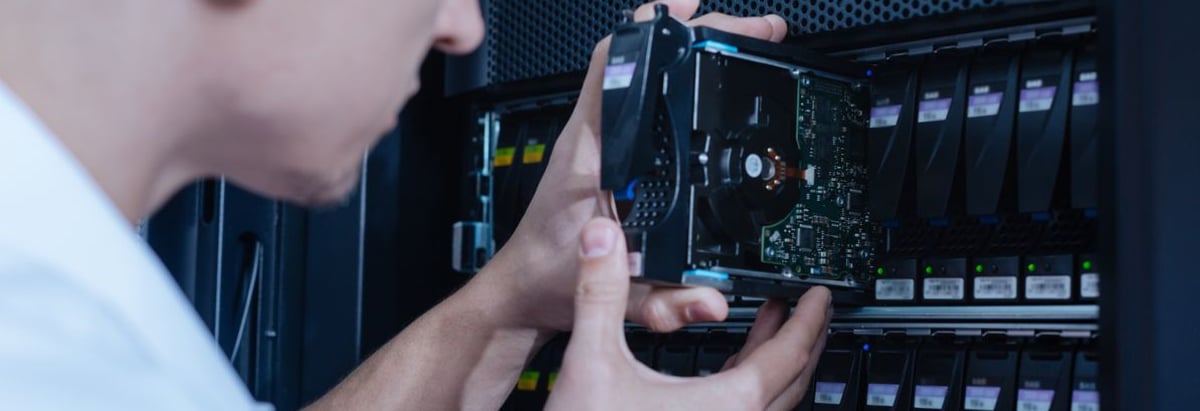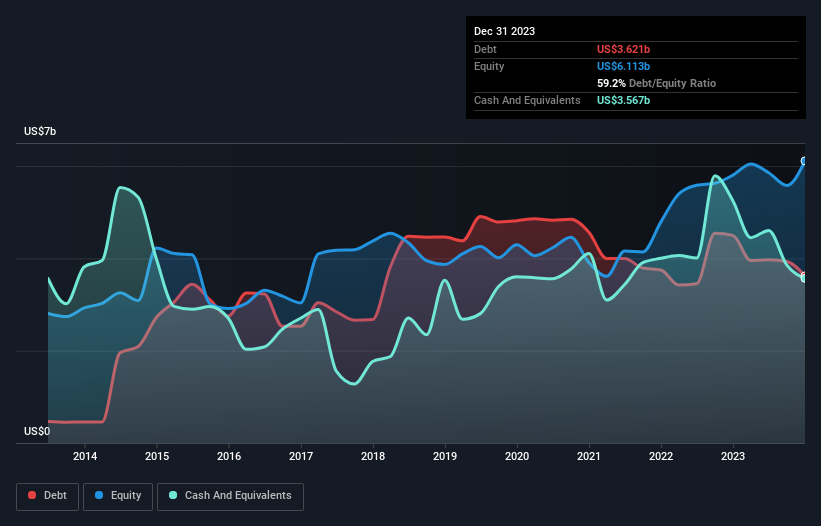- Hong Kong
- /
- Tech Hardware
- /
- SEHK:992
These 4 Measures Indicate That Lenovo Group (HKG:992) Is Using Debt Extensively

Some say volatility, rather than debt, is the best way to think about risk as an investor, but Warren Buffett famously said that 'Volatility is far from synonymous with risk.' So it might be obvious that you need to consider debt, when you think about how risky any given stock is, because too much debt can sink a company. We note that Lenovo Group Limited (HKG:992) does have debt on its balance sheet. But the real question is whether this debt is making the company risky.
Why Does Debt Bring Risk?
Debt and other liabilities become risky for a business when it cannot easily fulfill those obligations, either with free cash flow or by raising capital at an attractive price. If things get really bad, the lenders can take control of the business. While that is not too common, we often do see indebted companies permanently diluting shareholders because lenders force them to raise capital at a distressed price. Of course, the upside of debt is that it often represents cheap capital, especially when it replaces dilution in a company with the ability to reinvest at high rates of return. The first step when considering a company's debt levels is to consider its cash and debt together.
Check out our latest analysis for Lenovo Group
What Is Lenovo Group's Net Debt?
The image below, which you can click on for greater detail, shows that Lenovo Group had debt of US$3.62b at the end of December 2023, a reduction from US$4.50b over a year. However, it also had US$3.57b in cash, and so its net debt is US$53.8m.

How Strong Is Lenovo Group's Balance Sheet?
The latest balance sheet data shows that Lenovo Group had liabilities of US$26.7b due within a year, and liabilities of US$6.69b falling due after that. Offsetting these obligations, it had cash of US$3.57b as well as receivables valued at US$12.1b due within 12 months. So its liabilities total US$17.8b more than the combination of its cash and short-term receivables.
Given this deficit is actually higher than the company's massive market capitalization of US$14.2b, we think shareholders really should watch Lenovo Group's debt levels, like a parent watching their child ride a bike for the first time. In the scenario where the company had to clean up its balance sheet quickly, it seems likely shareholders would suffer extensive dilution. Lenovo Group has a very little net debt but plenty of other liabilities weighing it down.
We measure a company's debt load relative to its earnings power by looking at its net debt divided by its earnings before interest, tax, depreciation, and amortization (EBITDA) and by calculating how easily its earnings before interest and tax (EBIT) cover its interest expense (interest cover). The advantage of this approach is that we take into account both the absolute quantum of debt (with net debt to EBITDA) and the actual interest expenses associated with that debt (with its interest cover ratio).
With debt at a measly 0.021 times EBITDA and EBIT covering interest a whopping 13.3 times, it's clear that Lenovo Group is not a desperate borrower. Indeed relative to its earnings its debt load seems light as a feather. The modesty of its debt load may become crucial for Lenovo Group if management cannot prevent a repeat of the 45% cut to EBIT over the last year. When it comes to paying off debt, falling earnings are no more useful than sugary sodas are for your health. When analysing debt levels, the balance sheet is the obvious place to start. But it is future earnings, more than anything, that will determine Lenovo Group's ability to maintain a healthy balance sheet going forward. So if you're focused on the future you can check out this free report showing analyst profit forecasts.
Finally, a business needs free cash flow to pay off debt; accounting profits just don't cut it. So it's worth checking how much of that EBIT is backed by free cash flow. During the last three years, Lenovo Group produced sturdy free cash flow equating to 62% of its EBIT, about what we'd expect. This cold hard cash means it can reduce its debt when it wants to.
Our View
We feel some trepidation about Lenovo Group's difficulty EBIT growth rate, but we've got positives to focus on, too. To wit both its interest cover and net debt to EBITDA were encouraging signs. Taking the abovementioned factors together we do think Lenovo Group's debt poses some risks to the business. While that debt can boost returns, we think the company has enough leverage now. There's no doubt that we learn most about debt from the balance sheet. But ultimately, every company can contain risks that exist outside of the balance sheet. Be aware that Lenovo Group is showing 3 warning signs in our investment analysis , you should know about...
When all is said and done, sometimes its easier to focus on companies that don't even need debt. Readers can access a list of growth stocks with zero net debt 100% free, right now.
If you're looking to trade Lenovo Group, open an account with the lowest-cost platform trusted by professionals, Interactive Brokers.
With clients in over 200 countries and territories, and access to 160 markets, IBKR lets you trade stocks, options, futures, forex, bonds and funds from a single integrated account.
Enjoy no hidden fees, no account minimums, and FX conversion rates as low as 0.03%, far better than what most brokers offer.
Sponsored ContentNew: AI Stock Screener & Alerts
Our new AI Stock Screener scans the market every day to uncover opportunities.
• Dividend Powerhouses (3%+ Yield)
• Undervalued Small Caps with Insider Buying
• High growth Tech and AI Companies
Or build your own from over 50 metrics.
Have feedback on this article? Concerned about the content? Get in touch with us directly. Alternatively, email editorial-team (at) simplywallst.com.
This article by Simply Wall St is general in nature. We provide commentary based on historical data and analyst forecasts only using an unbiased methodology and our articles are not intended to be financial advice. It does not constitute a recommendation to buy or sell any stock, and does not take account of your objectives, or your financial situation. We aim to bring you long-term focused analysis driven by fundamental data. Note that our analysis may not factor in the latest price-sensitive company announcements or qualitative material. Simply Wall St has no position in any stocks mentioned.
About SEHK:992
Lenovo Group
An investment holding company, develops, manufactures, and markets technology products and services.
Very undervalued with outstanding track record and pays a dividend.
Similar Companies
Market Insights
Community Narratives


